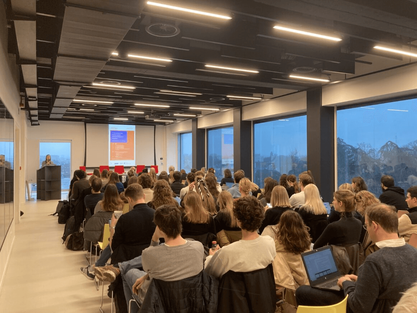5th Press Freedom Seminar: Journalism and Artificial Intelligence
(13-12-2023)

Prof. Sarah van Leuven (CJS) opened the seminar by emphasizing the enduring importance of a free press in the face of evolving digital landscapes and information flows. She highlighted the role of journalism as a watchdog, holding power accountable and combating misinformation. Prof. Van Leuven drew attention to the challenges journalists face, such as censorship and attacks, and discussed the ongoing conflict in the Gaza strip and accusations of AI-enabled shadowbanning of pro-Palestine content on social media platforms.
The seminar proceeded with two keynotes. The first keynote speaker was dr. Laurence Dierickx (ULB and University of Bergen, Norway). She discussed the evolving relationship between journalism and AI over five decades. While acknowledging the benefits of AI in journalism, including data processing and automation of certain tasks, dr. Dierickx highlighted potential risks, such as the creation of manipulated content, dissemination of propaganda, and challenges in ensuring information quality. Ethical frameworks, transparency, and collaboration between journalists and AI developers were proposed as essential elements for mitigating these risks.
Deniz Wagner, Adviser to the OSCE Representative on Freedom of the Media, addressed the impact of AI on media freedom. She discussed AI's potential in fact-checking but raised concerns about the erosion of trust due to opacity in AI systems. Wagner emphasized the need for evidence-based recommendations and guidance for stakeholders. Challenges in content moderation, curation, and creation were discussed, with a focus on algorithmic bias, risks of over-removal, and the impact on diversity and media pluralism.
After a short break, a panel discussion was held, moderated by Dr. Valerie Verdoodt (Faculty of Law and Criminology). Journalist Tom Van de Weghe (VRT) highlighted the pervasive presence of AI in news rooms (e.g. in combating disinformation), but expressed concerns about the potential undermining of human-created content. AI should be seen as tools assisting journalists, not as replacement for journalists. Human journalists should always be in control of the process. Pol Deltour, Director of VVJ Academy, discussed the Academy's role in providing AI training for journalists and the varied sentiments about AI's future in journalism. Caroline Locher, Secretary General of the Quebec Press Council, addressed ethical challenges and the need for self-regulation in adapting to AI's impact on journalism. Lidia Dutkiewicz, a doctoral researcher at the Centre for IT and IP Law at KU Leuven, discussed legal requirements for transparency and highlighted the perception challenges regarding articles assisted by generative AI.
Prof. Eva Lievens (Faculty of Law and Criminology) provided concluding remarks, emphasizing the societal importance of AI and the need for academics to monitor developments and advocate for safeguards. She encouraged students to engage in critical reflections on technology's impact on democratic values and thanked all participants.
In summary, the seminar delved into the complex relationship between AI and journalism, recognizing both the opportunities and challenges. The discussions emphasized the importance of ethical frameworks, transparency, collaboration, and ongoing education to navigate the evolving landscape of AI in journalism while preserving democratic values. The seminar provided a platform for experts to share insights, exchange perspectives, and contribute to the ongoing discourse on the intersection of AI and press freedom.
A more extensive report on the seminar can be downloaded here.
Organising Committee: Eva Lievens, Bart Vanhaelewyn, Sarah Van Leuven, Valerie Verdoodt
Acknowledgements: we are grateful for the financial support of Internationalisation@Home (Ghent University) and the Netherlands-Flanders Communication Association (Nefca).